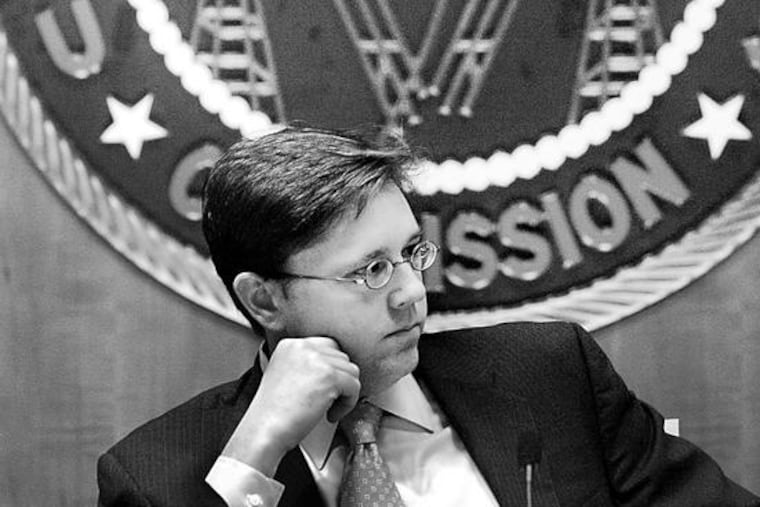Congressional report faults FCC's Martin
A scathing congressional report yesterday accused Federal Communications Commission Chairman Kevin Martin of manipulating information and demoting those who disagreed with him at the agency that regulates Comcast Corp. and other communications companies.

A scathing congressional report yesterday accused Federal Communications Commission Chairman Kevin Martin of manipulating information and demoting those who disagreed with him at the agency that regulates Comcast Corp. and other communications companies.
It also criticized Martin for potentially unjustified rate increases on telephone services for the deaf and speech-impaired that would cost consumers $100 million a year.
But the report, titled "Deception and Distrust: The Federal Communications Commission Under Chairman Kevin Martin," stopped short of saying Martin violated laws or procedures.
"He left us a blueprint for what not to do," U.S. Rep. Bart Stupak (D., Mich.) said yesterday in a news conference call. Stupak is chairman of the investigations subcommittee.
Martin said in a statement that he had run the FCC as other FCC heads had run it and noted that the investigation, after a year of trying, did not find legal violations.
"The report lacks facts that would have set the right context on many issues raised," said FCC spokesman Robert Kenny. In response to the rates issue, Kenny said the report was "debating a policy call" at the agency.
The investigation was continuing, Stupak said, and he hoped the report could lead to reforms at the agency.
The FCC is the latest federal regulator to come under scrutiny at the end of the Bush administration. The Food and Drug Administration was investigated for lapses in handling of tainted Chinese drug products. The Securities and Exchange Commission was sharply criticized for failing to regulate before the financial crisis.
Martin, a boyish-looking Bush appointee, has been a lightning rod over his regulatory actions toward the cable industry. Industry experts say Martin punished Comcast and other cable companies for failing to adopt stricter decency standards on pay-TV.
Martin has said that cable rates are too high and that the industry needs more competition. He was not available for comment.
"We went to extraordinary lengths to cooperate with the investigation," the FCC's Kenny said.
In the conference call, Stupak said the FCC did not fully cooperate. Some witnesses would not come forward, Stupak said, because they were afraid of retribution or of being "Martinized."
Martin "abused his power" and withheld information from the public and other FCC commissioners, the congressman said.
President-elect Barack Obama is expected to replace Martin as FCC chairman, but he could remain as a commissioner.
The Martin investigation was triggered in November 2007, when the chairman tried to enact sweeping new regulations on the cable industry, contending that its market share had crossed a congressionally mandated threshold. The cable industry said Martin's claims were bogus and beat him back with heavy lobbying on Capitol Hill and at the FCC.
Martin won a consolation with a new FCC rule restricting Comcast to 30 percent of the nation's pay-TV market. Comcast has appealed the 30-percent regulation to the courts. The company had no comment on yesterday's report.
Martin and the cable industry also have battled over "a-la-carte" programming, or buying cable channels individually rather than bundled. Martin supports it. The cable industry opposes it.
The industry has challenged a 2006 FCC report that says a-la-carte programming could be good for consumers. The report, issued under Martin, reversed the conclusion of a 2004 FCC report.
Yesterday's report provides a glimpse into the political pressure inside the FCC - in a 2005 e-mail exchange between Daniel Shiman, a career FCC economist, and Catherine Bohigian, senior legal adviser to Martin.
"Overall, I think pure a-la-carte would likely raise most cable bills, with fewer channels delivered," Shiman wrote to Bohigian.
Two minutes later, Bohigian replied: "Daniel, the report cannot conclude that a-la-carte would likely raise most cable bills, with fewer channels delivered. If that is going to be the conclusion, we need to stop now."